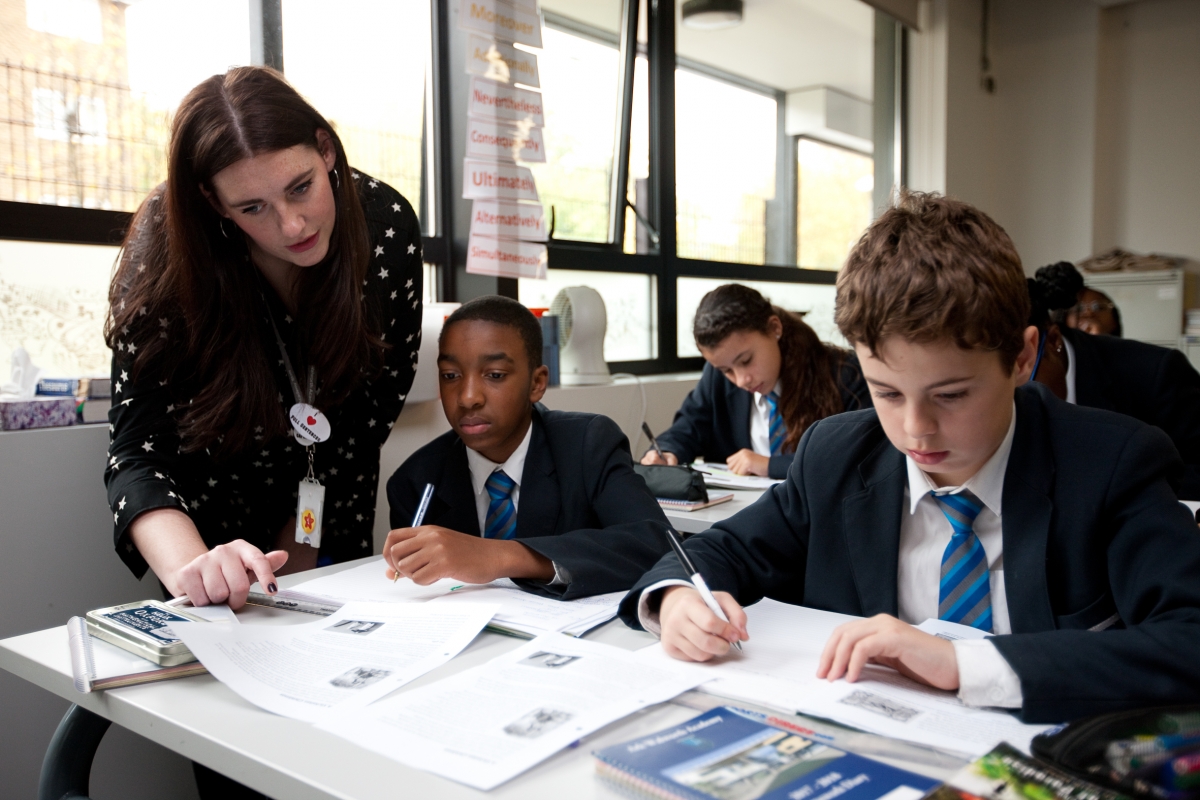 Amy McJennett has worked in education for the past 15 years, and is now Director of English Mastery. Amy has worked as an examiner, teacher, head of department and senior leader in UK schools.
Amy McJennett has worked in education for the past 15 years, and is now Director of English Mastery. Amy has worked as an examiner, teacher, head of department and senior leader in UK schools.
Amy co-founded and co-authored the English Mastery curriculum and teacher development programme with the aim of transforming teaching and student achievement in key stage 3 English. The programme launches nationally in September 2018.
I remember very clearly the day I completed my Secondary English PGCE. We were asked by our tutor, a very experienced headteacher, to share with one another our biggest fear on becoming teachers. I also remember very clearly my response. “What if the students don’t learn anything?” She dismissed my anxiety and with the authoritative voice of experience replied, “Don’t worry Amy, they always learn something.”
That response did absolutely nothing to quell my fears. Defining the ‘something’ that students learn is vitally important and it is clear that many agree; Ofsted’s focus on how schools plan their curriculum has been welcomed by the educational community.
For the Ark English team, the 2013 GCSE reform announcement was a really important moment and was the beginning of our curriculum overhaul. We were fed up of intervention-led teaching approaches. GCSE intervention had removed all joy from the subject and our students were simply parroting taught interpretations.
We saw this moment as our chance to rethink how we taught English in our classrooms. We wanted our students to learn more than ‘something’ and so we set to work on writing and piloting a brand new knowledge-rich, key stage 3 curriculum: English Mastery.
Designing, co-authoring and piloting the programme has been a privilege. We have worked alongside 7 schools, 40 talented teachers and 820 students to create a shared curriculum that is cohesive, cumulative and packed with substance. Every single lesson is part of the whole.
But of course, creating a shared curriculum is not without challenge and so, as we prepare to share our programme with the wider educational community, it seems timely to pinpoint the lessons we have learnt about curriculum design.
Lesson 1: English teachers are open-minded
If you ask an English teacher which books a student should study at key stage 3, they never hesitate. They can reel off their list and give you a solid and passionate argument to defend their choices.
A shared curriculum removes this element of choice. It means teaching a set text that you did not choose. We naturally presumed that this would become a sticking point. The first unit of work in the English Mastery curriculum is a Literary Heritage unit. How would we ever choose the perfect set of texts to excite both teachers and students?
We knew that we wanted students to read challenging stories that have changed the world and stood the test of time, but let’s face it, even that list is rather long. We also had some practical reservations about our own ambition. Teaching Jane Eyre at key stage 3 would be a very different experience to teaching Holes.
We deliberated over how to make the text selection process fair. We produced longlists, shortlists and conducted online surveys. We worried that the curriculum would be perceived as prescriptive or Gradgrindian but none of these early concerns came true.
A well-resourced, high-quality curriculum trumps all.
Lesson 2: Writing lessons that refer back to previous learning is tricky
The English Mastery curriculum is cumulative. We want students to remember what they have learnt long after they have left school. To help them achieve this, we knew we would need to return to key ideas and concepts to make sure learning was not lost.
For the year 7 units of work, this was relatively straightforward, but as we embarked on the year 9 content, this became much more complicated. There are 1400 lessons in the English Mastery curriculum. Deciding which concepts need recapping and remembering how and where the concept was first introduced requires planning maps on a gargantuan scale. And don’t talk to us about making a change or an edit – a small addition in year 7 will have repercussions throughout the entire curriculum!
It was, of course, worth it. In year 9, we introduce students to AC Bradley’s essays on the conventions of a tragic hero. To listen to students drawing on their knowledge of many famous protagonists – Boxer, Caliban, Helen Burns, Sherlock Holmes – to formulate and add substance to their thesis was exactly the level of subject expertise we were aiming for.
Lesson 3: Scholarly subject-specific communities are hugely powerful
When we started our pilot study, we talked a lot about the impact we wanted the curriculum to have on students’ progress and achievement. We talked less about the impact it might have on teachers. In doing so, we were short-sighted.
The training strand of our curriculum brings English teachers together. They already have the curriculum in common and so they already have a shared professional language and this makes their insights all the richer.
Our subject-specific community has enriched and developed the English Mastery curriculum in ways we would never have imagined. Likewise, the curriculum has benefited teachers and given them the one thing they need more than anything. More time.
In September 2018, our programme launches nationally and we will begin to work with partner schools beyond the Ark network.
We can’t wait to read the next chapter in our story.
Find out more about the English Mastery programme and how you can start using it in your school.
Want to know more? Register for our free event on Monday 19 February.

